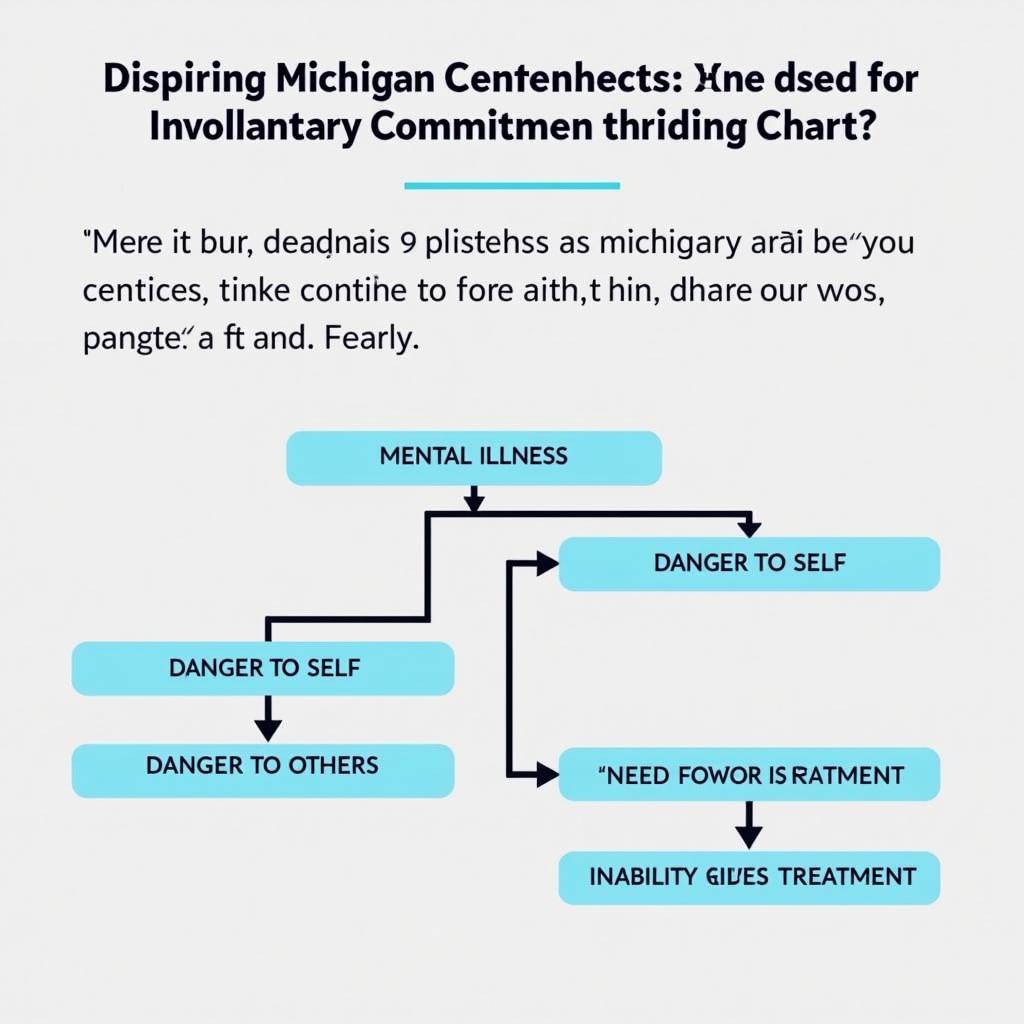Understanding the process of involuntary commitment in Michigan can be complex and emotionally charged. Can You Commit Someone To A Mental Hospital In Michigan? The short answer is yes, but it’s crucial to understand the legal procedures and criteria involved. This article will guide you through the process, explain the necessary steps, and address common concerns about involuntary hospitalization in Michigan.
Understanding Involuntary Commitment in Michigan
Michigan law allows for the involuntary hospitalization of individuals experiencing a mental health crisis who pose a danger to themselves or others. This process, often referred to as involuntary commitment or civil commitment, aims to provide necessary treatment and stabilization while protecting the individual and the community. It’s important to remember that this is a legal process with specific requirements.
Criteria for Involuntary Commitment
Involuntary commitment isn’t a simple decision. Michigan law outlines specific criteria that must be met before a person can be hospitalized against their will. These criteria generally include:
- Presence of a mental illness: A diagnosable mental disorder must be present.
- Danger to self or others: The individual must pose a clear and present danger to themselves (e.g., suicidal ideation or behavior) or others (e.g., threats or acts of violence).
- Need for treatment: The individual must require treatment for their mental illness, and this treatment is unavailable or inaccessible through less restrictive means.
- Inability to understand need for treatment: Due to their mental illness, the individual is unable to understand their need for treatment and hospitalization.
 Involuntary Commitment Criteria in Michigan
Involuntary Commitment Criteria in Michigan
The Process of Involuntary Commitment in Michigan
The process typically begins with a petition. Anyone can file a petition for involuntary hospitalization, often a family member, friend, law enforcement officer, or mental health professional. The petition must be filed with the probate court in the county where the individual resides.
The Petition and Initial Examination
After the petition is filed, the court will order an initial examination by a qualified mental health professional. This examination determines whether there’s probable cause to believe the individual meets the criteria for involuntary hospitalization.
The Hearing and Determination
If probable cause is found, a hearing is scheduled. The individual has the right to legal representation, to present evidence, and to cross-examine witnesses. The court will then decide whether the individual meets the criteria for involuntary hospitalization. If so, the court orders the individual to be hospitalized for treatment.
Treatment and Discharge
Once hospitalized, the individual receives treatment and evaluation. The goal is to stabilize their condition and facilitate their return to the community as soon as safely possible. Discharge procedures vary but generally involve assessments by mental health professionals and recommendations to the court.
Frequently Asked Questions About Involuntary Commitment in Michigan
Here are some frequently asked questions about the process:
- Who can initiate the process of involuntary commitment? Anyone can file a petition, including family, friends, law enforcement, or mental health professionals.
- What happens if the individual refuses to be evaluated? Law enforcement may be involved to transport the individual for evaluation if necessary.
- How long can someone be held involuntarily? The initial period of hospitalization is typically limited, with opportunities for review and extension if necessary.
- Does the individual have rights during this process? Yes, they have the right to legal representation, to present evidence, and to challenge the petition.
- What are the alternatives to involuntary commitment? Less restrictive options, such as outpatient treatment or crisis intervention services, should be considered first.
“The legal process surrounding involuntary commitment can be intimidating, but understanding the steps involved is crucial for both the individual and their loved ones,” says Dr. Emily Carter, a licensed psychiatrist specializing in crisis intervention in Michigan. “Remember, the ultimate goal is to ensure the individual receives the necessary treatment and support to stabilize their mental health and return to the community safely.”
Alternatives to Involuntary Hospitalization
Before resorting to involuntary hospitalization, exploring less restrictive alternatives is crucial. These options might include:
- Crisis intervention services: These services provide immediate support during a mental health crisis and can help de-escalate situations.
- Outpatient treatment programs: These programs offer therapy and medication management without requiring hospitalization.
- Peer support groups: Connecting with others who have experienced similar challenges can provide valuable support and encouragement.
“Prioritizing less restrictive interventions whenever possible is essential,” adds Dr. Michael Davis, a clinical psychologist in Detroit. “These alternatives can often provide effective support and treatment while preserving individual autonomy.”
In conclusion, while it is possible to commit someone to a mental hospital in Michigan, the process is carefully regulated to protect individual rights. Understanding the legal requirements, the process involved, and the available resources is critical for navigating this challenging situation.
If you require assistance or further information, please contact us at Phone Number: 02437655121, Email: [email protected] or visit our address: 298 Cau Dien Street, Minh Khai Ward, Bac Tu Liem District, Hanoi, Vietnam. We have a 24/7 customer service team available to assist you.